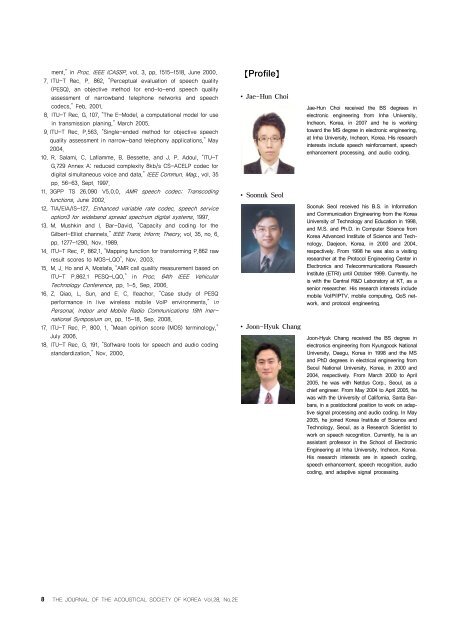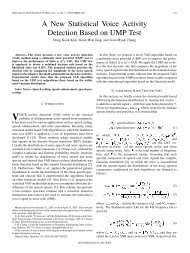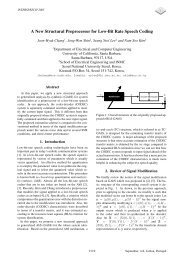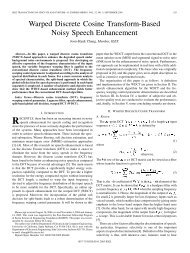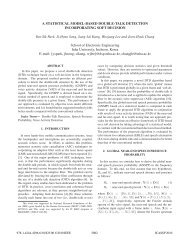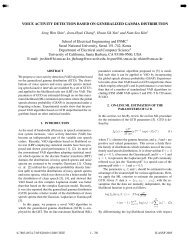A Study on Voice Communication Quality Criteria Under Mobile ...
A Study on Voice Communication Quality Criteria Under Mobile ...
A Study on Voice Communication Quality Criteria Under Mobile ...
You also want an ePaper? Increase the reach of your titles
YUMPU automatically turns print PDFs into web optimized ePapers that Google loves.
ment,” in Proc. IEEE ICASSP, vol. 3, pp. 1515-1518, June 2000.<br />
7. ITU-T Rec. P. 862, “Perceptual evaluati<strong>on</strong> of speech quality<br />
(PESQ), an objective method for end-to-end speech quality<br />
assessment of narrowband teleph<strong>on</strong>e networks and speech<br />
codecs,” Feb. 2001.<br />
8. ITU-T Rec. G. 107, “The E-Model, a computati<strong>on</strong>al model for use<br />
in transmissi<strong>on</strong> planing,” March 2005.<br />
9. ITU-T Rec. P.563, “Single-ended method for objective speech<br />
quality assessment in narrow-band teleph<strong>on</strong>y applicati<strong>on</strong>s,” May<br />
2004.<br />
10. R. Salami, C. Laflamme, B. Bessette, and J. P. Adoul, “ITU-T<br />
G.729 Annex A: reduced complexity 8kb/s CS-ACELP codec for<br />
digital simultaneous voice and data,” IEEE Commun. Mag., vol. 35<br />
pp. 56-63, Sept. 1997.<br />
11. 3GPP TS 26.090 V5.0.0, AMR speech codec; Transcoding<br />
functi<strong>on</strong>s, June 2002.<br />
12. TIA/EIA/IS-127, Enhanced variable rate codec, speech service<br />
opti<strong>on</strong>3 for wideband spread spectrum digital systems, 1997.<br />
13. M. Mushkin and I. Bar-David, “Capacity and coding for the<br />
Gilbert-Elliot channels,” IEEE Trans. Inform. Theory, vol. 35, no. 6,<br />
pp. 1277-1290, Nov. 1989.<br />
14. ITU-T Rec. P. 862.1, “Mapping functi<strong>on</strong> for transforming P.862 raw<br />
result scores to MOS-LQO”, Nov. 2003.<br />
15. M. J. Ho and A. Mostafa, “AMR call quality measurement based <strong>on</strong><br />
ITU-T P.862.1 PESQ-LQO,” in Proc. 64th IEEE Vehicular<br />
Technology C<strong>on</strong>ference, pp. 1-5, Sep. 2006.<br />
16. Z. Qiao, L. Sun, and E. C. Ifeachor, “Case study of PESQ<br />
performance in live wireless mobile VoIP envir<strong>on</strong>ments,” in<br />
Pers<strong>on</strong>al, Indoor and <strong>Mobile</strong> Radio Communicati<strong>on</strong>s 19th Inernati<strong>on</strong>al<br />
Symposium <strong>on</strong>, pp. 15-18, Sep. 2008.<br />
17. ITU-T Rec. P. 800. 1, “Mean opini<strong>on</strong> score (MOS) terminology,”<br />
July 2006.<br />
18. ITU-T Rec. G. 191, “Software tools for speech and audio coding<br />
standardizati<strong>on</strong>,” Nov. 2000.<br />
【Profile】<br />
∙ Jae-Hun Choi<br />
∙ So<strong>on</strong>uk Seol<br />
∙ Jo<strong>on</strong>-Hyuk Chang<br />
Jae-Hun Choi received the BS degrees in<br />
electr<strong>on</strong>ic engineering from Inha University,<br />
Inche<strong>on</strong>, Korea, in 2007 and he is working<br />
toward the MS degree in electr<strong>on</strong>ic engineering,<br />
at Inha University, Inche<strong>on</strong>, Korea. His research<br />
interests include speech reinforcement, speech<br />
enhancement processing, and audio coding.<br />
So<strong>on</strong>uk Seol received his B.S. in Informati<strong>on</strong><br />
and Communicati<strong>on</strong> Engineering from the Korea<br />
University of Technology and Educati<strong>on</strong> in 1998,<br />
and M.S. and Ph.D. in Computer Science from<br />
Korea Advanced Institute of Science and Technology,<br />
Daeje<strong>on</strong>, Korea, in 2000 and 2004,<br />
respectively. From 1998 he was also a visiting<br />
researcher at the Protocol Engineering Center in<br />
Electr<strong>on</strong>ics and Telecommunicati<strong>on</strong>s Research<br />
Institute (ETRI) until October 1999. Currently, he<br />
is with the Central R&D Laboratory at KT, as a<br />
senior researcher. His research interests include<br />
mobile VoIP/IPTV, mobile computing, QoS network,<br />
and protocol engineering.<br />
Jo<strong>on</strong>-Hyuk Chang received the BS degree in<br />
electr<strong>on</strong>ics engineering from Kyungpook Nati<strong>on</strong>al<br />
University, Daegu, Korea in 1998 and the MS<br />
and PhD degrees in electrical engineering from<br />
Seoul Nati<strong>on</strong>al University, Korea, in 2000 and<br />
2004, respectively. From March 2000 to April<br />
2005, he was with Netdus Corp., Seoul, as a<br />
chief engineer. From May 2004 to April 2005, he<br />
was with the University of California, Santa Barbara,<br />
in a postdoctoral positi<strong>on</strong> to work <strong>on</strong> adaptive<br />
signal processing and audio coding. In May<br />
2005, he joined Korea Institute of Science and<br />
Technology, Seoul, as a Research Scientist to<br />
work <strong>on</strong> speech recogniti<strong>on</strong>. Currently, he is an<br />
assistant professor in the School of Electr<strong>on</strong>ic<br />
Engineering at Inha University, Inche<strong>on</strong>, Korea.<br />
His research interests are in speech coding,<br />
speech enhancement, speech recogniti<strong>on</strong>, audio<br />
coding, and adaptive signal processing.<br />
8 THE JOURNAL OF THE ACOUSTICAL SOCIETY OF KOREA Vol.28, No.2E


